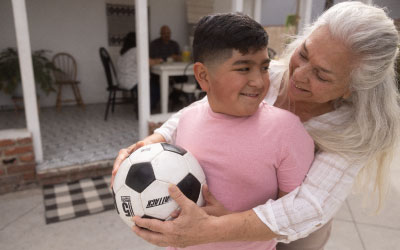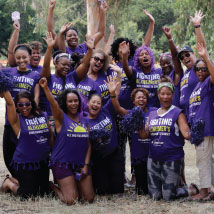
Double Your Impact for the Holidays
Double Your Impact for the Holidays
Your urgently needed year-end gift can go twice as far to provide care and support and accelerate Alzheimer's research this holiday season — and all year long. Show your giving spirit today during this 2x Match Challenge.
Donate NowOur Commitment to Diversity, Equity and Inclusion
 At the Alzheimer's Association, we believe that engaging diverse perspectives is critical to achieving health equity — meaning that all communities have a fair and just opportunity for early diagnosis and access to risk reduction and quality care. Underrepresented and underserved communities are disproportionately impacted by Alzheimer’s and dementia, and yet are less likely to be diagnosed; less likely to be recruited to participate in research; and less likely to have access to care and support services. This is unacceptable and must change.
At the Alzheimer's Association, we believe that engaging diverse perspectives is critical to achieving health equity — meaning that all communities have a fair and just opportunity for early diagnosis and access to risk reduction and quality care. Underrepresented and underserved communities are disproportionately impacted by Alzheimer’s and dementia, and yet are less likely to be diagnosed; less likely to be recruited to participate in research; and less likely to have access to care and support services. This is unacceptable and must change.
We are leading the way by developing strategic partnerships with trusted national and local organizations to create a pathway to greater health equity, mission engagement and inclusion for everyone. We are building an organizational culture of understanding while pursuing diversity, equity and inclusion (DEI) through education and policies. The Association is committed to providing all communities with resources and education to realize our vision of a world without Alzheimer’s and all other dementia.
- Advancing DEI through our core values
- Acknowledging health inequities and Alzheimer's
- Learning from our DEI partners
- Community activation
- Advocating for health equity
- Hiring for diverse backgrounds
- DEI resources for Alzheimer's researchers
- DEI education for medical professionals
- Reports and data
- Contact us
Advancing diversity, equity and inclusion through our core values
Even as the Alzheimer's Association continues to grow and evolve, our core values remain constant. They are reflected in the people we hire, the initiatives we pursue and the partnerships we form. We value:

Inclusivity

Community

Accountability

Agility

Integrity
Acknowledging health inequities and Alzheimer's
Alzheimer's disproportionately affects underserved and underrepresented populations in the United States. Learn more about the impact of Alzheimer's and dementia and see resources for:
Asian Americans and Pacific Islanders
Black Americans
Hispanic Americans
LGBTQ+ Americans
Native Americans
Women
Health inequity is a public health crisis. Public health professionals must do more to address the impact of Alzheimer's and dementia on underserved and underrepresented communities. Learn about the actions that communities are taking to address social determinants of health and reduce inequities.
Learning from our diversity, equity and inclusion partners
Supporting diversity, equity and inclusion is vital to our mission. We partner with more than 30 national partners and over 600 local organizations to strengthen our outreach to every population and provide communities with culturally appropriate resources and support to address the Alzheimer’s crisis.National Partnerships
Learn about our partnerships and the communities they serve.
Meet Our DEI PartnersHealth Equity Impact Report
Learn about the Association's work toward achieving health equity in dementia care.
Read the ReportCommunity activation
ALZ Health Equity Coalitions
The Alzheimer’s Association is proud to partner with G Davis Productions and Films to launch ALZ Health Equity Coalitions in pursuit of health equity. The company produced the stage play, "Unforgettable," which depicts the experience of caring for a person living with Alzheimer’s. We are enlisting partners to unite as coalitions and implement "Unforgettable" and other resources into Alzheimer’s education and awareness events across the United States.ALZ BrainTrust
The Association is piloting an initiative to examine racial inequity and dementia-related clinical trials. This research project is designed to expand access to care and support, establish community health engagement hubs in metropolitan areas, and develop a replicable model for increasing Black and Hispanic American engagement in dementia clinical research.Advocating for health equity
Any future Alzheimer's and dementia treatments or model of care must work for all, not just the privileged few. That’s why we advocate for equity in access to clinical trials, diagnosis and care through legislation like the bipartisan Equity in Neuroscience and Alzheimer's Clinical Trials (ENACT) Act. The ENACT Act will increase education and outreach to underserved and underrepresented communities, encourage diversity of clinical trial staff, and make it easier for underrepresented groups to participate in research.
Hiring for diverse backgrounds
The Alzheimer's Association is committed to building a culture of inclusivity, compassion, collaboration and dedication for our employees and the communities we serve. We know that the only way to truly serve underserved and underrepresented communities is if we're guided by voices with diverse perspectives.Learn more about careers at the Alzheimer's Association in:
-
Administration.
-
Advocacy.
-
Care and support programming.
-
Fundraising and financial development.
-
Leadership.
-
Marketing and communications.
-
Medical science and research.
-
Special events and conferences.
-
Volunteer management.
-
And more.
The Alzheimer's Association is regularly named a Top Diversity Employer by DiversityJobs and a Best Large Nonprofit to Work For by The NonProfit Times.
See which career opportunities are currently available at the Alzheimer's Association.
Diversity, equity and inclusion resources for Alzheimer's researchers
The Alzheimer's Association seeks to advance diversity, equity and inclusion in Alzheimer's research by supporting researchers from diverse backgrounds. This support will not only advance research, but improve health equity and increase access to clinical trials for underrepresented populations, too.
Our resources for researchers include:
-
Grants for researchers from underserved and underrepresented backgrounds.
-
Professional Interest Areas (PIAs) for researchers investigating the intersection of diversity, dementia and disparities, and sex and gender differences in Alzheimer's.
-
Webinars focused on the latest findings and conversations in Alzheimer's research, health equity and diversity.
-
A research conference dedicated to addressing health disparities in the field of Alzheimer’s and dementia research and treatment.
Diversity, equity and inclusion education for medical professionals
Our Education Center offers free, on-demand resources for clinicians — often with complimentary CME credit — about crucial DEI topics, including:
-
Epidemiology of Dementia and Cognitive Decline in Diverse Populations
-
Moving Toward Sustainable Representation in Clinical Trials in ADRD
-
Biofluid Based Biomarkers in Neuropsychiatric Syndromes — The Disparities Webinar
Reports and data
The Alzheimer's Association 2025 Health Equity Impact Report: Fostering Collaboration and Understanding documents the Association's ongoing work aimed at achieving health equity in dementia care, ensuring all communities have a fair and just opportunity for early diagnosis and access to risk reduction and quality care. The report highlights important progress the Alzheimer’s Association is making in advancing health equity initiatives across all strategic areas of the Association.
The Association's 2021 Alzheimer’s Disease Facts and Figures special report, Race, Ethnicity and Alzheimer's in America (PDF), examined the perspectives and experiences of Asian, Black, Hispanic, Native and White Americans in regard to Alzheimer's and dementia care. The report also looked at the devastating impact the COVID-19 pandemic is having on people living with Alzheimer's and their caregivers.
